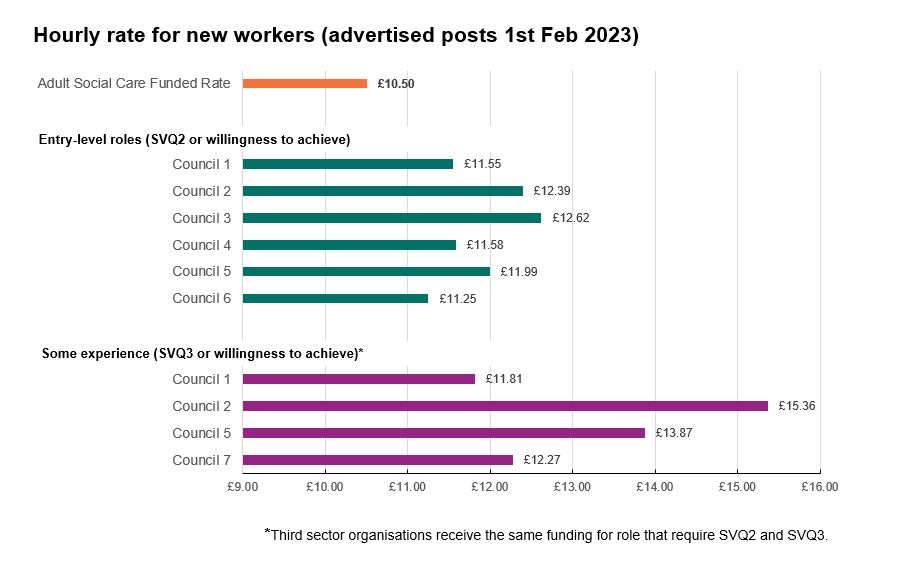2 February 2023
The Scottish budget for third sector social care: is it all costs, no value?
There is no money: The mantra of the moment.

There is no money: The mantra of the moment.
But clearly that’s not really the case.
Scotland’s resource funding for 2023-24 is almost £42bn[1]. Now, inflationary pressures alone will clearly mean that won’t go as far as £42bn a year ago. And the economic outlook is certainly gloomy. Money is tight for sure; very tight. But when costs are high and budgets under pressure, political allocation decisions show relative value in a stark light.
In this context, the relative value this Scottish Budget places on third sector social care organisations, their staff – and on the people requiring social care and support – is really poor.
In his Budget statement, we heard the Deputy First Minister herald a “formidable pay settlement” for the NHS this year and a 40p per hour uplift for our social care staff next year.
It is therefore no surprise that there is tremendous anger in our sector at this small, comparative uplift in the midst of a recruitment and retention crisis that threatens the critical services we provide to people across Scotland.
Since the Budget was announced though, I have been reflecting on a conundrum.
The Scottish Government clearly takes the responsibilities of staff providing social care and support seriously. These are people who work closely with older people, children and families, disabled people, people with learning disabilities, who are homeless, who are experiencing ill health, including poor mental health, who’ve been through the criminal justice system. And just look at how the government has acted to change the sector over recent years:
Social care and support staff are skilled practitioners who are now required to meet professional qualification requirements.
Social care workers are now professionally regulated. They must abide by Codes of Practice and can be suspended from, or removed from, the register if concerns about their fitness to practise are upheld.
They work in highly regulated services because, of course, it’s important that people using those services receive high quality care from employed staff.
And they are subject to PVG checks because support workers must demonstrate they are suitable to work with people who are vulnerable.
All, in principle, understandable changes in the context of the significant responsibilities held by social care and support staff.
So, here’s the conundrum: The government thinks that frontline social care staff need to be skilled, qualified, professionally regulated and police checked because of the responsible, high-risk nature of the work they do, and yet… they are worth only £10.90 an hour from April. They are worth only what the Living Wage Foundation has set as the minimum amount to ‘get by’.
For me, that’s a balance sheet that just doesn’t add up.
The Scottish Government keeps repeating that social care staff have received a 14.7% pay rise over the last two years.
But that’s a game of walnuts under cups. Let’s clarify a few things.
First of all, percentages very conveniently hide huge disparities in the cash people receive. In April 2020, the basic gross salary funded by the Scottish Government for an adult third sector support worker was £18,135. In the NHS someone doing the equivalent job[2] was on £20,700 (and let’s not even start on the differences in pensions and other benefits).
This year, a third sector support worker salary funded by Scottish Government was £20,475, unlike their NHS equivalent who was awarded £23,914.
Despite a government commitment to Fair Work in Social Care dating back to 2019, the salary gap between equivalent posts has actually increased from 14.1 to 16.8% in the past two years. In terms of parity, our sector has gone backwards. In fact, a third sector adult social care worker on a basic salary as funded by Scottish Government in 2022 now earns less, in cash terms, than the equivalent NHS worker earned in 2020.

Second, let’s be clear that the Scottish Government has chosen to apply social care uplifts only to those providing registered services to adults. Everyone else, staff in children’s services for example, have had no guaranteed uplift funded from Scottish Government.
And here’s another thing….The much-quoted 14.7% uplift oddly includes a pay rise no-one has even seen in their pay packet yet. In a most unconventional move, the government has chosen to include the recently announced April 2023 pay uplift (again only for adults) in their headline figure for the ‘past two years’[3].
And all these figures for social care staff apply only to those employed by not for profit and independent sector organisations, such as charities who are commissioned to provide public services. They don’t apply to social care staff employed by councils – who do equivalent work. Following the intervention of Scottish Government, local government staff also enjoyed a far higher pay rise this year – from a higher baseline – than their not-for-profit colleagues.
This week we compared the social care support worker starting salaries in a number of jobs advertised by local authorities across Scotland. Almost all were receiving at least £1 more per hour than the £10.50 floor set by Scottish Government for our sector. That’s a very attractive £2,000 difference in annual salary.
Finally, we keep hearing figures from Scottish Government about how much it would cost them to increase salaries for staff in third and independent sector social care organisations. As if those increased wages wouldn’t result in increased tax revenue and spend to offset a good proportion of the additional investment – as the Scottish Women’s Budget Group modelled in their report this week[4].
And as if those increased wages wouldn’t help to ensure services were actually fully staffed to provide the care and support that people right across Scotland need to live independently, stay in work or in school, to be connected and participate in their communities, to be well, to have their human rights respected… and of course, to stay out of hospital.
Scotland talks a good Fair Work game, but in this budget the Scottish Government makes some pretty stark choices for third sector social care organisations, their staff and the people who rely on social care. These are decisions on costs which do not reflect the value of our staff and the people they work with, and which certainly don’t deliver Fair Work.
The Coalition of Care & Support Providers in Scotland (CCPS), alongside our members, is committed to collaborating with the Scottish Government to deliver on Fair Work for the social care sector. But the threat to our services is real; it is happening now, and we can’t wait any longer.
Even before this winter kicked in, 63% of CCPS members were considering taking emergency measures such as reducing services or handing back contracts. So, we are calling on the government to demonstrate that they really do value third sector social care and support staff. They deserve nothing less – as do the 1 in 20 Scottish people who are likely to need social care support next year.
The costs of not doing so are, quite simply, profound.
So, CCPS is calling on the Scottish Government to take 4 steps to Fair Work now:
- Immediately implement the updated Real Living Wage (£10.90), backdated to 22 September 2022, as a minimum uplift for ALL social care support staff in the third and independent sectors.
- From April 2023, implement a Scottish Social Care Living Wage by committing to a 2023-24 social care uplift for all staff, to an hourly rate of at least £12.
- Pay all uplifts on 100% contract value to ensure employers can invest in all their staff fairly.
- And publish a three-year timetable in the next Programme for Government to deliver Fair Work in Social Care through parity of pay and key terms & conditions.
We’re not asking for much; we just want a fair settlement for the people providing vital care across Scotland. So, come on Scottish Government let’s get behind the social care sector…now.
Rachel Cackett
CEO
Coalition of Care and Support Providers Scotland
2 February 2023
[1] Budget 2023-24 | Scottish Parliament
[2] Following publication of the Community Integrated Care report, Unfair to Care, we have used AfC Band 3 pay scales as our comparator. Social care salaries have been calculated using a 37.5 hour week.
[3] Meeting of the Parliament: 19/01/2023 | Scottish Parliament Website
[4] Towards-a-transformative-universal-adult-social-care-support-service-for-Scotland.pdf (swbg.org.uk)


